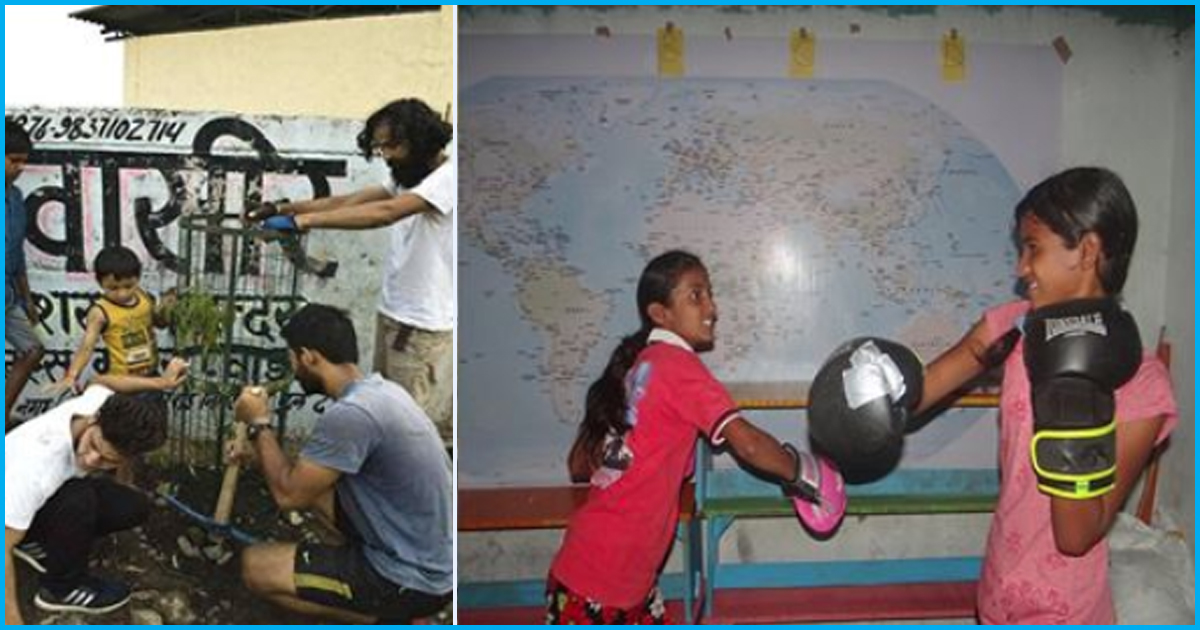
From Girl's Education To Entreprenuership; This Pahaadi Society In Uttrakhand Is Fighting Against Migration
1 Oct 2018 11:53 AM GMT
Editor : Apurwa Shrivastava
When not writing transformational stories, Apurwa ideates methods to help brands amplify their social initiatives. She believes that the world can be made beautiful with collaborative efforts and that impact is possible if one has the intent!
With over 70% rural population, India is certainly a country that lives in its villages. The plight of Indian villages in the present context scopes restricted development, large-scale migration, distressed ecosystem etc. However, Lalurikhal village is taking lead in development from girl’s education to water harvesting, waste management to entrepreneurship among other things.
‘Pahaadi Society’ founded by ‘Devender Singh Negi’, and managed by ‘Kasia Drobener’ has taken the exemplary initiative to make Lalurikhal, a remote village in Uttarakhand, sustainable and developed on all fronts. In an exclusive interview with The Logical Indian, the vanguards of the society reveal how the initiative has inspired and anchored people of Lalurikhal to be the masters of their own fate. They talk about things that have been accomplished, future goals and vision for a better tomorrow.
Who is ‘Pahaadi Society’?
Pahaadi Society is founded by ‘Devender Singh Negi’ (Dev) (who hails from Lalurikhal) and managed by ‘Kasia Drobener’ (who has moved to India all the way from Poland) and a group of volunteers from around the globe. Dedicated to Lalurikhal village, it is an initiative that promotes local culture through tourism, supports ecology, promotes organic culture and permaculture, imparts education, encourages a healthy lifestyle among the villagers and promotes health care. In this way, the society is not only uniting villagers to make their village sustainable but is also empowering individuals through local farming and entrepreneurship.
The Pahadi society started off by planting over 200 trees in Dehradun. They were accompanied by volunteers and local people of the city. The green expedition covered Namdev Enclave, Kashmiri colony, Dashmeshpuri, ITI Majra and other adjoining local points. Consecutively, a professional ecology educator from Poland ‘Dagmara Mialkowska’ came down all the way to India to be a part of the initiative as a volunteer. Together, they went to various school to teach children to care about planet earth.
However, as Dev says, “The way forward was to percolate down into the villages to bring significant changes from the grassroots level. We moved to Lalurikhal.” “Growing up, I saw the perils of the villagers. I observed how people abandon the village due to lack of opportunities. They go to the cities and work as daily wage labourers. This not only sometimes overcrams the cities but also leaves the vast agricultural land back in the village undone. To solve the problem of migration, it is important to aware people about the opportunities that can be created in the village itself. To do this we started ‘Laluri Life project’ under which we inducted various enterprise to achieve ecological, financial, educative and empowerment aim.” It was in the year 2016-2017 that the society completely absorbed itself to the upliftment of the village in all ways.
Dev Singh Negi (founder), Kasia Drobner (manager) and Paul Tavernier (volunteer) talk about the accomplishments, future goals and challenges faced by the Pahaadi Society, in an exclusive interview with the Logical Indian.
Environment
Pahaadi Society along with the volunteers and the kids now organizes a cleaning day on which together they clean the entire village, pick up trash and put biodegradable and non-biodegradable waste in separate trash cans. These trash cans have been installed by the society in the village. Not only this, but the kids are also taught craft and art made out of waste material such as plastic. Other than that, the ‘Pahaadi Society’ has been experimenting with the most viable method to conserve water. Besides regularly cleaning the springs and the community water tank, the society has planted a number of ‘banjh oaks’ to retain water and prevent soil erosion. This not only revives the dying spring but also lays the ground for better agriculture. Another method of water harvesting adopted by the village after a geological study done at Dob gramsabha (Dob village, Lalurikhal village and Doblu village) by Dr. US Rawat is the ‘Chaal Khaal system’. In this method, small percolation pits are dug for water harvesting.
Tourism
Tourism is a great way to contribute to the financial state of a place and that of people positively. Tourism, in turn, creates jobs of different sorts. ‘Pahaadi Society’ has taken initiatives to promote eco-tourism of Lalurikhal. The volunteers made many promo paintings of the village and put it up on the walls of various hostels of Uttarakhand to attract travellers from different parts of the world. They are helping set homestays in households for the tourists in the village. It not only supports many families but has also stopped some people to migrate to the cities for daily wages. To get the message far and wide, the society also has a pompous YouTube channel called ‘Pahaadi’ in which they give the virtual tour of Lalurikhal dressed beautifully in green and also makes sketches in order to restore dignity and respect in the villagers for their culture.

Entrepreneurship
Enterprising is empowerment. It has well been understood by the people of Lalurikhal village. To attain financial independence, Pahaadi society is working on the project of mushroom farming. The villagers, as Dev says, will be made both producers and managers of the product. The profit shall be equally divided among the villagers. The ‘Pahaadi Society’ will gain no profit whatsoever. “It has taken almost 9 months to smooth out the land manually for mushroom farming. We hope to be able to do it soon.”, added Dev. Other than that the Society is also assembling self-help groups to start the production of jams, lecso and pickles from locally grown fruits and vegetables to sell not just in India but also to other countries. Women of Lalurikhal village also make patchwork to be sold in Poland. It is headed by Kasia Drobener who is helping women to monetize their skill.

Empowerment and Education
The society’s work in the field of education is influential. Today, over 40 children of Lalurikhal village receive free education. The society started evening classes on a rooftop when they did not have any place. Later, they found 2 rooms which they cleaned and freshly painted to make the official classrooms. Not only this but the society also manually made benches for the students and started a small library. The library has books both in English and Hindi. “It is a matter of pride”, says Kasia “that our kids can read Harry Potter now.”
Education for Kasia who dedicates her days to educate children of Lalurikhal is much more than just books. She not only carries out interesting science experiments in the class but also organizes workshops to teach both boys and girls about sensitive topics like menstruation. “It is important for kids to be educated about such topics before they start to form perceptions or start to believe in superstitions.”, she said in an exclusive interview with The Logical Indian. “It is important for both young, teenager and adult girls to know their own body, to know that menstruating is natural and nobody should tell them that its gross. Similarly, it’s important to educate boys so that they know how to behave with girls on periods. There are many pre-conceived notions about menstruation in the village that we are trying to change.”, she added.
Gender equality is an important aspect of education and empowerment for Kasia. She says, “The attitude of people with respect to gender equality can be a little toxic. Therefore, as part of education, we thought its important for kids to understand that there is no gender-based craft or game. So, one day we organized boxing classes for girls and doll making classes for boys.”
Challenges
Kasia says, “When we started the project, we thought that it would be easy if not very smooth but people in the villages sometimes can be averse to change. Some people have plans for their children. They want them to grow up and move to the cities to become daily wage workers and earn for the family. It is really challenging to change the mindset.” Kasia is relentlessly working towards counselling the parents of such bright kids who can have a thriving career if they devote their time instead in studying.
Pahaadi Society invites passionate volunteers from around the world who come down to the village with open hearts to help the society in all its endeavours. The Logical Indian interviewed one such fervent volunteer Paul Tavernier, a student of geography from University of Reunion, France. He said, “I personally think that Indians, like the rest of the world, have to get a better understanding of nature, ecosystems, and how we are part of it. It will be difficult, or impossible for India to achieve sustainability if deforestation is not under check, if forests are fired for land , the soil and water strongly polluted by plastics and chemicals, as it destroys the biotopes and kills all the living organisms necessary to do organic farming, to counteract erosion, and, by disturbing and changing microclimates, and so, climate in its whole, makes the problem of access to resources even worst. See how poor is the health of the hills surrounding Laluri! This will not change from government action but by the education of people.”
Future Goals
Kasia continues, “In future, our goal is to see the entire village working as one body, one lubricated mechanism taking care of each and every piece of itself.” She also says, “In future we will have a lot of organic vegetables and fruits, clean houses, minimalized garbage and biogas systems. We are also aiming to build a good medical centre, a large functional library, forest health-path and one world famous festival. After all this is achieved, we still want to be a village that offers homestays to tourists instead of hotels.”
On the other hand, Tavernier who is especially passionate about rural development added, “Locals have formed cooperatives to investigate the issues impacting the village life and are constantly trying to find better solution. In the western countries, the rural exodus has happened last century and is slowly starting to get counteracted, it is a present issue for a larger part of the world and India is particularly concerned. In Lalurikhal, actions are taking place and it might be a long journey.” He closes by saying, “Every acting village in India can be an example that change, in fact, is possible. There is immense pride in belonging to a village, more so, a village that is sustainable and self-sufficient.”
Also Read: After Seeing Students Shivering In Cold, This Woman Decided To Transform Govt Schools In Uttarakhand
 All section
All section















